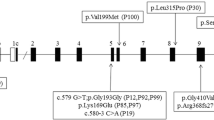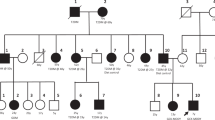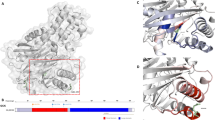Abstract
Purpose
Heterozygous inactivating mutations in the glucokinase (GCK) gene result in the asymptomatic fasting hyperglycemia named as GCK-MODY or MODY2. The genetic testing can effectively avoid the misdiagnosis and inappropriate treatment for GCK-MODY.
Methods
A total of 25 unrelated families with MODY were screened for mutations in coding region of GCK by using direct sequencing. Three different bioinformatics tools such as PolyPhen2, Mutation Taster and PROVEAN were performed to predict the function of mutant proteins. The glucose profile was recorded by continuous glucose monitoring system (CGMS) to evaluate the glycemic variability for the GCK-MODY patient.
Results
Our study identified five GCK mutations in 24% of the families (6/25): two novel mutations (I126fs and G385A) and three already described mutations (G44S, H50fs and S383L). In silico analyses predicted that these mutations altered structural conformational changes. The values of mean amplitude of glycemic excursions (MAGE), an important index of blood glucose fluctuation in CGMS system, were 0.81 in the first 24 h and 1.61 in the second 24 h record in the patient with GCK-MODY (F3), suggesting little glucose fluctuation.
Conclusion
The genetic testing is suggested to be important to differentiate GCK-MODY from other types of diabetes. CGMS might be used to screen GCK-MODY cases prior to genetic testing.



Similar content being viewed by others
References
C.C. Thomas, L.H. Philipson, Update on diabetes classification. Med. Clin. North. Am. 99(1), 1–16 (2015). https://doi.org/10.1016/j.mcna.2014.08.015
C. Lepore, E. Damaso, V. Suazo, R. Queiroz, R.L. Junior, E. Moisés, Molecular changes in the Glucokinase gene (GCK) associated with the diagnosis of Maturity Onset Diabetes of the Young (MODY) in pregnant women and newborns. Curr. Diabetes Rev. 2021. https://doi.org/10.2174/1573399817666210806110633
T. Urakami, Maturity-onset diabetes of the young (MODY): current perspectives on diagnosis and treatment. Diabetes Metab. Syndr. Obes. 12, 1047–1056 (2019). https://doi.org/10.2147/dmso.s179793
B.M. Shields, S. Hicks, M.H. Shepherd, K. Colclough, A.T. Hattersley, S. Ellard, Maturity-onset diabetes of the young (MODY): how many cases are we missing. Diabetologia 53(12), 2504–2508 (2010). https://doi.org/10.1007/s00125-010-1799-4
H.U. Irgens, J. Molnes, B.B. Johansson, M. Ringdal, T. Skrivarhaug, D.E. Undlien, O. Sovik, G. Joner, A. Molven, P.R. Njolstad, Prevalence of monogenic diabetes in the population-based Norwegian Childhood Diabetes Registry. Diabetologia 56(7), 1512–1519 (2013). https://doi.org/10.1007/s00125-013-2916-y
W. Fendler, M. Borowiec, A. Baranowska-Jazwiecka, A. Szadkowska, E. Skala-Zamorowska, G. Deja, P. Jarosz-Chobot, I. Techmanska, J. Bautembach-Minkowska, M. Mysliwiec, A. Zmyslowska, I. Pietrzak, M.T. Malecki, W. Mlynarski, Prevalence of monogenic diabetes amongst Polish children after a nationwide genetic screening campaign. Diabetologia 55(10), 2631–2635 (2012). https://doi.org/10.1007/s00125-012-2621-2
T. Yorifuji, R. Fujimaru, Y. Hosokawa, N. Tamagawa, M. Shiozaki, K. Aizu, K. Jinno, Y. Maruo, H. Nagasaka, T. Tajima, K. Kobayashi, T. Urakami, Comprehensive molecular analysis of Japanese patients with pediatric-onset MODY-type diabetes mellitus. Pediatr. Diabetes 13(1), 26–32 (2012). https://doi.org/10.1111/j.1399-5448.2011.00827.x
H. Liang, Y. Zhang, Recognition of maturity-onset diabetes of the young in China. J. Diabetes Investig. 12(4), 501–509 (2021). https://doi.org/10.1111/jdi.13378
A.E. Hughes, E. De Franco, E. Globa, N. Zelinska, D. Hilgard, P. Sifianou, A.T. Hattersley, S.E. Flanagan, Identification of GCK-maturity-onset diabetes of the young in cases of neonatal hyperglycemia: a case series and review of clinical features. Pediatr. Diabetes 22(6), 876–881 (2021). https://doi.org/10.1111/pedi.13239
F. Ping, J. Fu, X. Xiao, Distinguishing the lipid profile of GCK-MODY patients and its correlation with hsCRP levels. Front. Endocrinol. 13, 1024431 (2022). https://doi.org/10.3389/fendo.2022.1024431
C. Pihoker, L.K. Gilliam, S. Ellard, D. Dabelea, C. Davis, L.M. Dolan, C.J. Greenbaum, G. Imperatore, J.M. Lawrence, S.M. Marcovina, E. Mayer-Davis, B.L. Rodriguez, A.K. Steck, D.E. Williams, A.T. Hattersley, Prevalence, characteristics and clinical diagnosis of maturity onset diabetes of the young due to mutations in HNF1A, HNF4A, and glucokinase: results from the SEARCH for Diabetes in Youth. J. Clin. Endocrinol. Metab. 98(10), 4055–4062 (2013). https://doi.org/10.1210/jc.2013-1279
T. Wang, S. Ding, S. Li, H. Guo, X. Chen, Y. Huang, J. Huang, J. Wu, C. Hu, C. Fang, J. Hu. A novel mutation in INS gene linked to permanent neonatal diabetes mellitus. Endocrine 64(3), 719–723 (2019). https://doi.org/10.1007/s12020-019-01905-0
G. Alkorta-Aranburu, D. Carmody, Y.W. Cheng, V. Nelakuditi, L. Ma, J.T. Dickens, S. Das, S.A.W. Greeley, D. Del Gaudio, Phenotypic heterogeneity in monogenic diabetes: the clinical and diagnostic utility of a gene panel-based next-generation sequencing approach. Mol. Genet. Metab. 113(4), 315–320 (2014). https://doi.org/10.1016/j.ymgme.2014.09.007
E.H. Cho, J.W. Min, S.S. Choi, H.S. Choi, S.W. Kim, Identification of maturity-onset diabetes of the young caused by glucokinase mutations detected using whole-exome sequencing. Endocrinol. Metab. 32(2), 296–301 (2017). https://doi.org/10.3803/EnM.2017.32.2.296
Y. Zhou, S. Wang, J. Wu, J. Dong, L. Liao, MODY2 in Asia: analysis of GCK mutations and clinical characteristics. Endocr. Connect. 9(5), 471–478 (2020). https://doi.org/10.1530/ec-20-0074
Z. Ming-Qiang, D. Yang-Li, H. Ke, W. Wei, F. Jun-Fen, Z. Chao-Chun, D. Guan-Ping, Maturity onset diabetes of the young (MODY) in Chinese children: genes and clinical phenotypes. J. Pediatr. Endocrinol. Metab. 32(7), 759–765 (2019). https://doi.org/10.1515/jpem-2018-0446
K.K. Osbak, K. Colclough, C. Saint-Martin, N.L. Beer, C. Bellanné-Chantelot, S. Ellard, A.L. Gloyn, Update on mutations in glucokinase (GCK), which cause maturity-onset diabetes of the young, permanent neonatal diabetes, and hyperinsulinemic hypoglycemia. Hum. Mutat. 30(11), 1512–1526 (2009). https://doi.org/10.1002/humu.21110
M. Pinelli, F. Acquaviva, F. Barbetti, E. Caredda, S. Cocozza, M. Delvecchio, E. Mozzillo, D. Pirozzi, F. Prisco, I. Rabbone, L. Sacchetti, N. Tinto, S. Toni, S. Zucchini, D. Iafusco. Identification of candidate children for maturity-onset diabetes of the young type 2 (MODY2) gene testing: a seven-item clinical flowchart (7-iF). PLoS One 8(11), e79933 (2013), https://doi.org/10.1371/journal.pone.0079933
A.J. Chakera, A.M. Steele, A.L. Gloyn, M.H. Shepherd, B. Shields, S. Ellard, A.T. Hattersley recognition and management of individuals with hyperglycemia because of a heterozygous glucokinase mutation. Diabetes Care 38(7), 1383–1392 (2015), https://doi.org/10.2337/dc14-2769
Y. Ma, X. Han, X. Zhou, Y. Li, S. Gong, S. Zhang, X. Cai, L. Zhou, Y. Luo, M. Li, W. Liu, X. Zhang, Q. Ren, and L. Ji, A new clinical screening strategy and prevalence estimation for glucokinase variant-induced diabetes in an adult Chinese population. Genet Med. 2018. https://doi.org/10.1038/s41436-018-0282-3
E. Longato, G. Acciaroli, A. Facchinetti, L. Hakaste, T. Tuomi, A. Maran, G. Sparacino, Glycaemic variability-based classification of impaired glucose tolerance vs. type 2 diabetes using continuous glucose monitoring data. Comput. Biol. Med. 96, 141–146 (2018). https://doi.org/10.1016/j.compbiomed.2018.03.007
N. Nomura, K. Iizuka, E. Goshima, K. Hosomichi, A. Tajima, S. Kubota, Y. Liu, K. Takao, T. Kato, M. Mizuno, T. Hirota, T. Suwa, Y. Horikawa, D. Yabe, Glucokinase-maturity onset diabetes mellitus in the young suggested by factory-calibrated glucose monitoring data: a case report. Endocr. J. 69(4), 473–477 (2022). https://doi.org/10.1507/endocrj.EJ21-0526
J. Zhou, H. Li, X. Ran, W. Yang, Q. Li, Y. Peng, Y. Li, X. Gao, X. Luan, W. Wang, W. Jia, Establishment of normal reference ranges for glycemic variability in Chinese subjects using continuous glucose monitoring. Med. Sci. Monit. 17(1), Cr9–Cr13 (2011). https://doi.org/10.12659/msm.881318
Q. Ren, P. Zhang, W. Pang, Y. Ma, S. Gong, T. Ba, W. Liu, F. Zhang, X. Zhang, R. Zhang, X. Wang, X. Zhang, W. Yang, F. Lv, L. Gao, X. Han, L. Ji, A Comparison of daily glucose fluctuation between GCK-MODY and type 2 diabetes using continuous glucose monitoring technology. Diabetes. 72(6), 812–818 (2023). https://doi.org/10.2337/db22-0566
Acknowledgements
This study was supported by grants from Jiangsu Provincial Double-Innovation Doctor Program and Gusu health personnel program. We thank the patient and their family members in this study and gratefully acknowledge the skillful technical support of all the nursing and medical staff at department of endocrinology in the Second Affiliated Hospital of Soochow University. We also thank the Shanghai Diabetes Institute and School of Biological & Basic Medicine Sciences of Soochow University for support of genetic sequencing.
Author contributions
C.F. and J.H. contributed to the study conception and design. Material preparation, data collection and analysis were performed by M.Z. and Y.W. The first draft of the manuscript was written by T.W. and all authors commented on previous versions of the manuscript. We also thank C.H. from the Shanghai Diabetes Institute for support of genetic sequencing. All authors read and approved the final manuscript.
Author information
Authors and Affiliations
Corresponding authors
Ethics declarations
Conflict of interest
The authors declare no competing interests.
Ethical approval
All procedures performed in studies involving human participants were in accordance with the ethic committee of the Second Affiliated Hospital of Soochow University and with the 1964 Helsinki declaration and its later amendments or comparable ethical standards.
Informed consent
Informed consent was obtained from all individual participants included in the study.
Additional information
Publisher’s note Springer Nature remains neutral with regard to jurisdictional claims in published maps and institutional affiliations.
Rights and permissions
Springer Nature or its licensor (e.g. a society or other partner) holds exclusive rights to this article under a publishing agreement with the author(s) or other rightsholder(s); author self-archiving of the accepted manuscript version of this article is solely governed by the terms of such publishing agreement and applicable law.
About this article
Cite this article
Wang, T., Zhu, M., Wang, Y. et al. Two novel GCK mutations in Chinese patients with maturity-onset diabetes of the young. Endocrine 83, 92–98 (2024). https://doi.org/10.1007/s12020-023-03509-1
Received:
Accepted:
Published:
Issue Date:
DOI: https://doi.org/10.1007/s12020-023-03509-1




